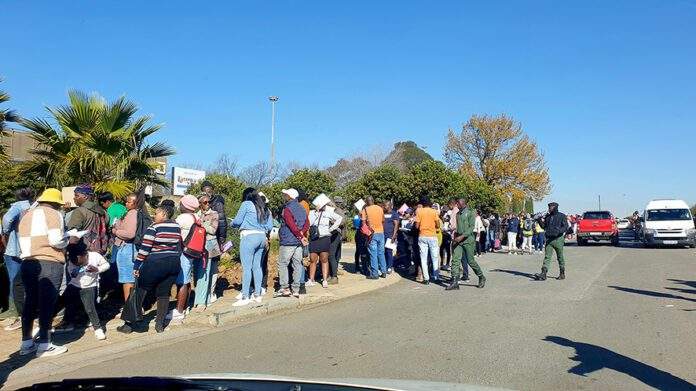Finding a job in Mpumalanga has become almost impossible — just ask Mthobisi Mathe.
The 28-year-old from Makoko, a poverty-stricken village bordering the Kruger National Park outside White River, is one of over 20 000 young people who applied for just 300 general worker posts at the City of Mbombela in November.
The posts have yet to be allocated, with the municipality blaming the overwhelming volume of physical applications for delays in finalising the selection process.
Mathe’s story serves as a heartbreaking illustration of the lengths young people will go to in order to increase their chances of surviving.
“I borrowed money to get to Mbombela because I believed something would come from it,” he recently told Sunday World.
“I was number 38 in the queue that day. I thought coming early would improve my chances. I was wrong.”
Physical applications
Mathe, who lives close to the Numbi Gate in Kruger National Park, has seen his friends put their lives in danger by breaking into the park to steal animals for food.
“I’ve watched guys go into Kruger with nothing but the hope and come out in body bags,” he said.
“These are guys who don’t poach endangered species for cash but are only hunting among predators for the survival of their families.”
When the City of Mbombela advertised the posts, hopefuls were instructed to submit physical applications at the municipal offices. The queues were unimaginable.
“We stood there from the early hours before the gates were opened. You could see it in everyone’s eyes — we were all just praying for a way out.”
He criticised the municipality’s outdated approach to application submissions.
“Obviously, the fact that we applied for general worker posts is self-evident that we are poor. The costs of printing documents, filling them in, and having to travel and queue the whole day are simply unbearable.
“Why are we not using digital platforms when the rest of the world does everything online?” he asked.
Call for transparency
ActionSA’s provincial legislator Thoko Mashiane raised the issue via a press statement.
“ActionSA demands fairness and transparency in the City of Mbombela’s hiring process,” Mashiane said.
“With so many hopeful job seekers, the municipality must explain how shortlisting was done. Troubling reports have emerged that a predetermined list of candidates, allegedly linked to senior politicians, was used.”
She called for an independent investigation into the claims; however, the municipality denied the allegations.
“Our process is transparent, and there is no predetermined list,” said City of Mbombela spokesperson Joseph Ngala.
“If ActionSA has evidence, we will assist in filing criminal charges. We cannot allow misinformation to exploit the real struggles of young people.”
Dire need for work
Ngala said the process was delayed by the sheer number of applications.
“This shows that there is a dire need for work, and our young people are willing to take anything. It is irresponsible for political parties to exploit their struggle.”
For Mathe, silence is all he has received.
“I checked my phone every day, thinking maybe today’s the day they will call. They never did,” he said.
In January, he left for the Highveld to search for work in eMalahleni and Middelburg. It was another dead end.
“It is now clear that to get a job, you must already have money in order to bribe officials. I handed out CVs everywhere but got nothing.”
Now Mathe is returning to Makoko in April — still jobless, still hoping, still refusing to pick up a rifle.
“I won’t go into Kruger, no matter how hungry I get. We’re not lazy. We’re just locked out of opportunities even when we are willing to do general work.”
Labour market challenges
South Africa continues to face serious labour market challenges, with the unemployment rate at 31.9% in the fourth quarter of 2024.
Time-related underemployment also remains a concern, affecting 4.6% of the workforce — about 788 000 people working less than 35 hours a week but wanting more work.
Women (5.4%) and adults aged 35–64 (4.8%) face the highest underemployment.
The hardest-hit sectors include private households and construction, while provinces like Limpopo and Free State report the highest rates.
Despite a slight recovery since the Covid-19 pandemic, underemployment reflects deep inequalities and poor job quality.
The International Labour Organisation urges better tracking of underutilised labour to inform effective policy interventions and promote more stable, full-time employment across all regions and sectors.



